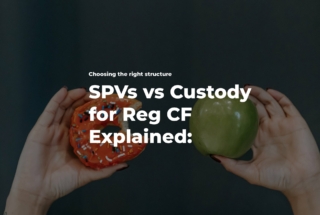VC and Crowdfunding: Partners or Competitors
No time to read? Let AI give you a quick summary of this article.
Venture funds and crowdfunding platforms help businesses get financing for launch or expansion. The acquired capital is often used for scaling up existing activities, expanding to a new market, or launching a new project.
Some companies address their financial needs to venture investors while others opt for crowdfunding. This leads us to a logical question.
Do crowdinvesting platforms compete with venture capital funds for startups? Can they collaborate in funding a business? Let’s have a look at all the details.
What you will learn in this post:
Crowdfunding vs venture capital
A business seeking investments needs to understand clearly what to count on if it’s getting money from a VC fund and what to expect if it’s raising funds on a crowdinvesting platform. There are pros and cons in both cases.
Crowdfunding platforms vs venture capital funds
| Crowdfunding | VC firms | |
| Money invested | Limited to $5M per 12 months | Practically unlimited |
| Investor’s control level | Low | High |
| Requirements for the project | Flexible | Strict |
| Social impact | High | Low |
| Taxation requirements | Low | High |
| Experience | No | Yes |
| Business type | LLC | C Corporation |
How much VCs invest compared to crowdfunding
As for the crowdfunding, the SEC permits a company to raise not more than $5 million during 12 months1. This is what regulation crowdfunding or Tittle III allows for. However, there are also other regulations such as Reg A/A+ or Reg D which can offer startups anything between $10 to $75 million.
Venture capital firms can invest more money, so the average deal size in 2021 was around $14 million2 for later stage companies, according to Statista. The key here is “later stage”, because crowdfunding focuses on the “early stage”.
Investor’s control level
Venture capital firms get a share in a business. Normally, getting funds from a VC involves accepting the investor’s valuation and terms. Some startups are not ready for it, and at some stages, it is unnecessary.
In such cases, crowdfunding is a better option. When raising funds through a crowdfunding platform, fundraisers may offer a share of the profit but not the share in a company. The majority of control stays with the company stakeholders.
Requirements for the project
Venture capitalists access the project very carefully and invest only if there is a high possibility of profit. In crowdfunding, investors may provide funds because they got inspired by the project idea. Crowdfunding platforms perform project screening before placing an offering but requirements there cannot be compared to those set by the VC.
However, regulations get stricter, crowdfunding platforms get smarter and provide a decent level of due diligence, identity verification and startup qualification which makes crowdfunding a competitive source of funds.
Social impact
If a company wants to create social impact, crowdfunding may be more beneficial because it offers more publicity. For venture capitalists, the social value of a project is not as important as its potential to generate profit.
This, however, may not be that absolute. There are lots of social impact investing and sustainability programs in Europe and the US which push businesses in a greener and more socially-friendly direction.
Experience
Venture capital firms have extensive experience in operating businesses. Most venture investors are entrepreneurs with proven records. Companies that get funding from a VC receive not only money but also expertise and valuable advice on how to lead the business to success.
Crowdfunding platforms offer funds from multiple investors. Many of them have never been in a business and may have just been inspired by the project. In the case of raising funds from a crowd, one cannot rely on professional help.
Company type
Startups that raise funds through crowdfunding platforms can remain an LLC without converting to a C corporation. This gives startup founders more freedom and control over their company.
Venture capital firms consider tax implications and stockholder rules3, this is why they prefer investing in a C corp.
A business may consider upgrading to a C-company when it needs:
- More than $5 million investments a year
- Knowledge and expert advice that a VC fund manager can offer
- Get credibility in the market and among investors
Can venture capital firms and crowdfunding platforms collaborate?
Venture capital firms and crowdfunding platforms are not direct competitors. They focus on different types of businesses at different development stages, so potential collaboration between them is possible.
During the early stages, a startup can raise funds through crowdfunding to develop and grow its business. At later stages though, the company may need to expand to new markets or launch a new business direction. For that, it will need bigger investments and may consider venture capital.
For the crowdfunding platforms that work with such clients, it may be a logical solution to either expand the level of services on the platform or refer these clients to a VC firm for a commission.
In another scenario, if a company is applying to get investment from a venture capital firm but doesn’t comply with all the requirements, the VC can pass the startup to a crowdfunding platform. So, venture funds and crowdfunding platforms can successfully collaborate.
Launching a VC fund platform or crowdfunding marketplaces
If you are thinking of launching a crowdfunding platform or a VC investing portal that allows you automating the deal flow, startup qualification, identity verification and money processing – check out LenderKit white-label investment solutions.
Our investment software adheres to both crowdfunding and venture capital and will help you launch a custom platform as fast as possible without excessive costs. The VC investment software comes with a set of ready-made features that enable your platform to operate at full scale. And if you want to tweak anything, our investment platform development team is at your service.




